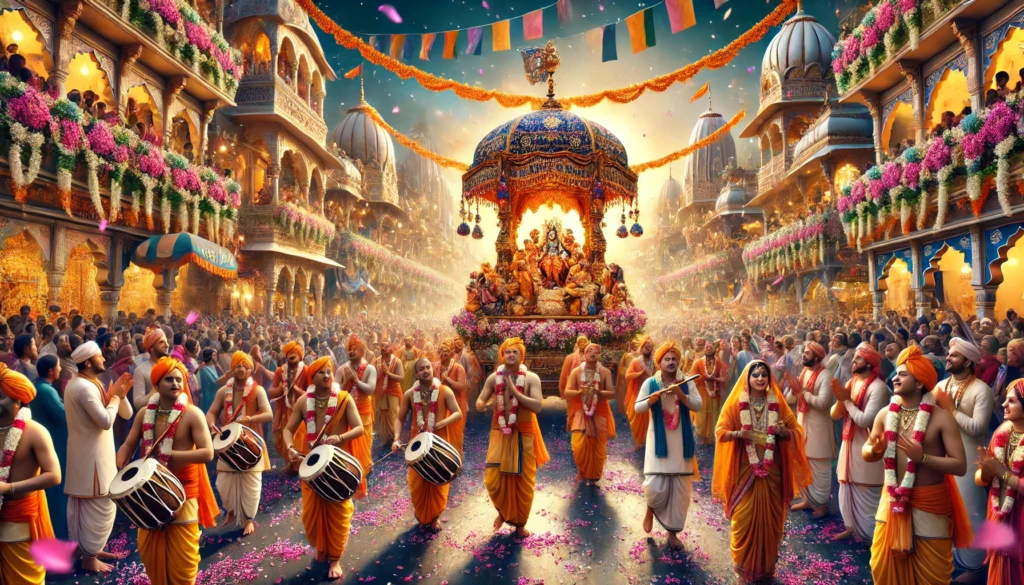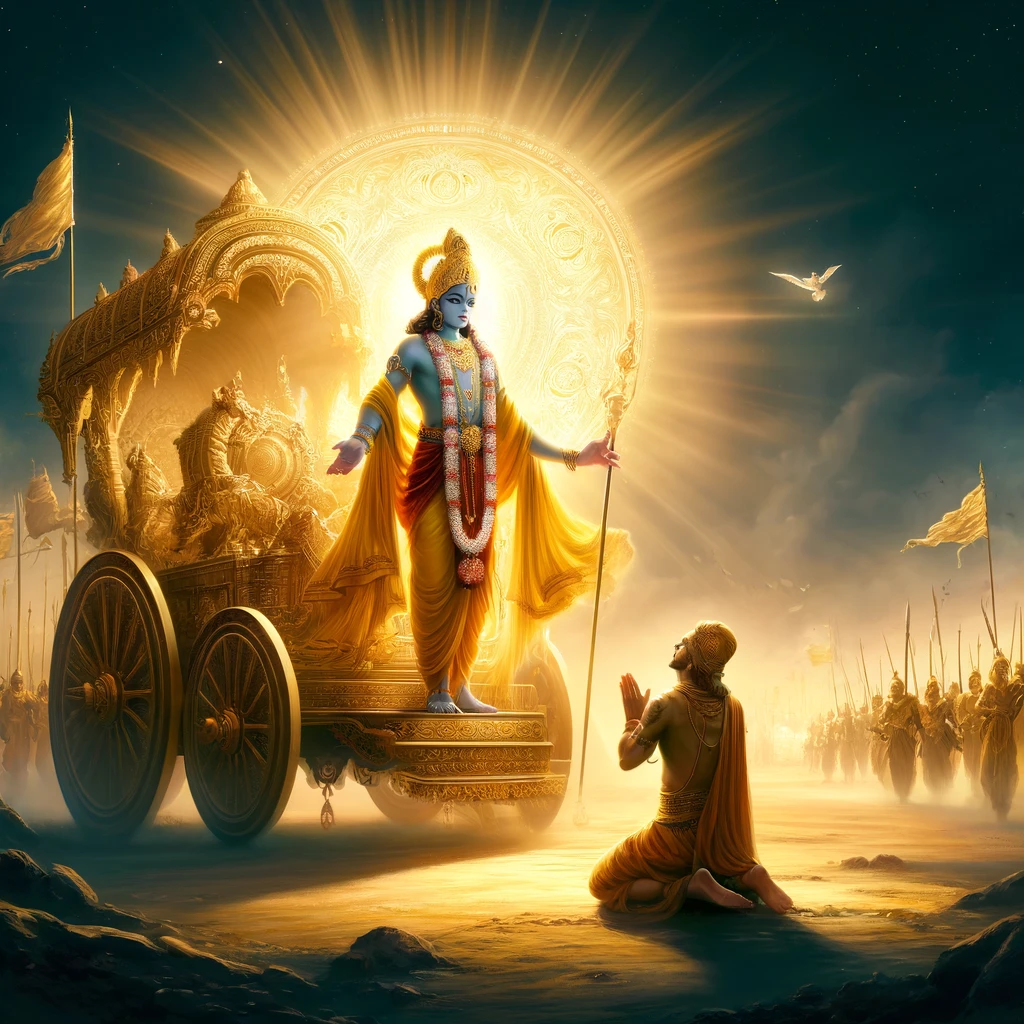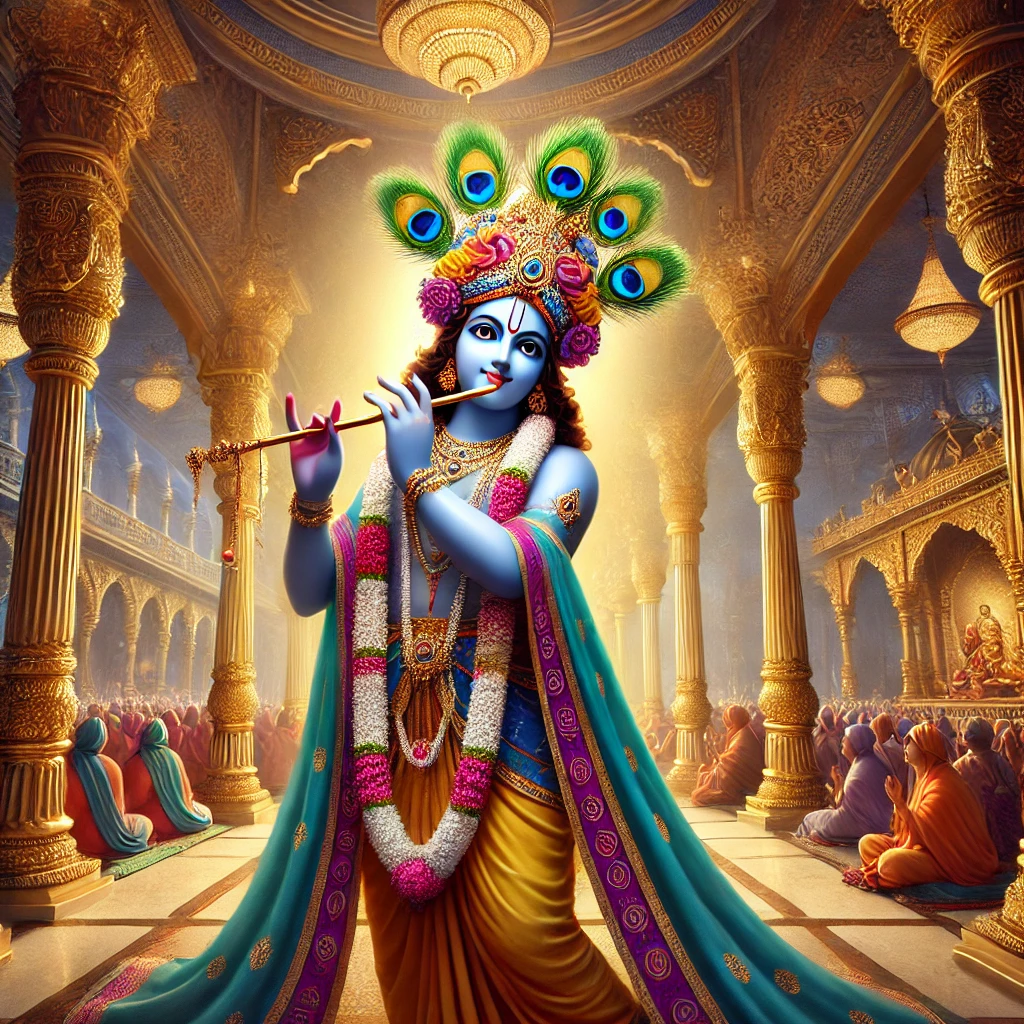In the vast tapestry of Vedic history, few figures stand as tall as the great Bhishma. His life, meticulously chronicled in the sacred Mahabharata and elucidated by His Divine Grace A.C. Bhaktivedanta Swami Prabhupada, offers us profound insights into the essence of devotion, duty, and the eternal principles of Krishna consciousness. Let us embark on an inspiring journey through the life of this revered figure, whose story continues to illuminate the path of spiritual seekers across millennia.
The Divine Origin
Bhishma, originally named Devavrata, was born to King Shantanu and the divine river goddess Ganga. This celestial birth itself signifies the intertwining of the material and spiritual realms, a central theme in Vaishnava philosophy. Just as the Ganges descends from the spiritual world to purify the earth, Bhishma’s life serves to purify our understanding of devotional service.
The Kurukshetra War presented Bhishma with his greatest spiritual test – the conflict between his personal affection and his duty.
Early Life and Sacred Vows
Bhishma’s legendary vow of lifelong celibacy and renunciation of the throne is a powerful reminder of the principle of sacrifice in bhakti-yoga. He made this vow to fulfill his father’s desire to marry Satyavati. As Lord Krishna states in the Bhagavad-gita (18.5):
“Acts of sacrifice, charity and penance are not to be given up; they must be performed. Indeed, sacrifice, charity and penance purify even the great souls.”
Bhishma’s sacrifice was not merely for worldly gains, but a selfless act to uphold dharma and family harmony. This teaches us that true renunciation is not about abandoning our duties, but performing them with detachment and devotion to the Supreme Lord.
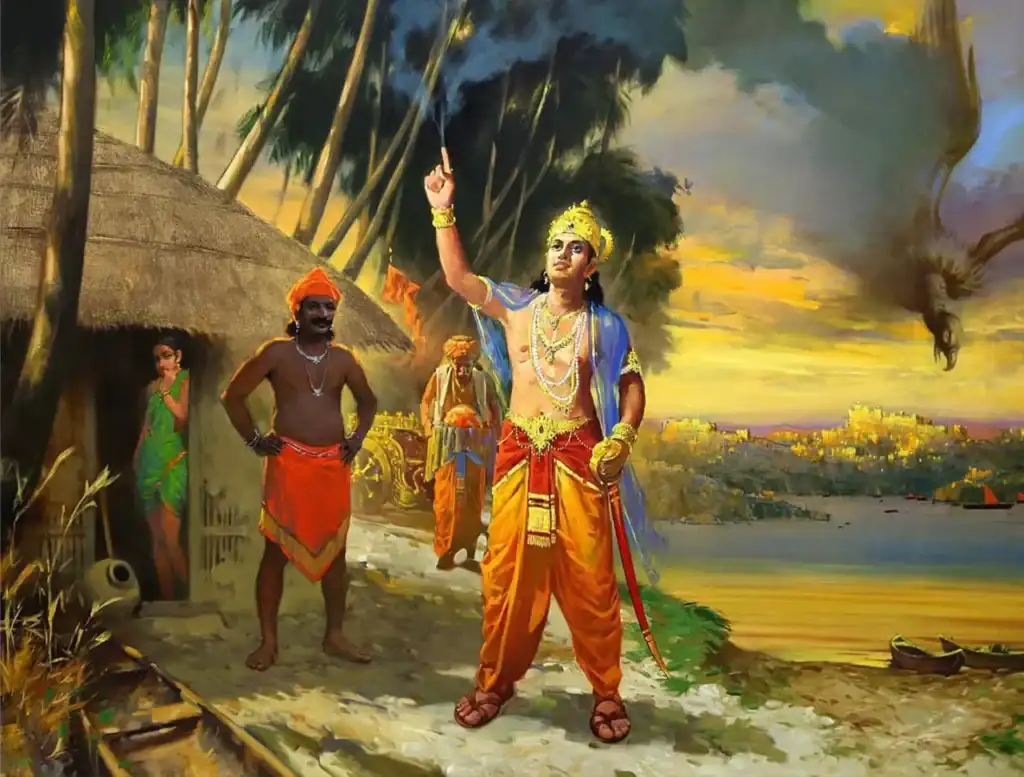
The Revered Patriarch of the Kuru Dynasty
Throughout his life, Bhishma stood as an unshakeable pillar of righteousness in the royal court of Hastinapura. His unwavering commitment to truth and justice echoes the words of Lord Krishna in the Bhagavad-gita (3.21):
“Whatever action a great man performs, common men follow. And whatever standards he sets by exemplary acts, all the world pursues.”
Bhishma’s life exemplifies how a leader should govern with wisdom, compassion, and strict adherence to spiritual principles. In our own lives, we can strive to embody these qualities in our interactions with family, colleagues, and society at large.
Even in his final moments on the battlefield, Bhishma imparts timeless wisdom and profound insights drawn from the depths of Vedic philosophy.
The Test of Loyalty
The Kurukshetra War presented Bhishma with his greatest spiritual test – the conflict between his personal affection and his duty. Despite knowing the righteousness of the Pandavas’ cause, he was bound by his vow to fight for the Kauravas. This dilemma mirrors our own struggles in material existence, where we often find our spiritual aspirations at odds with worldly attachments. Srila Prabhupada explains in his purport to Srimad-Bhagavatam (1.9.42):
“A pure devotee of the Lord is always in dilemma because of the dual nature of his existence. He always seeks to please the Lord, but at the same time cannot disregard his obligations in the material world.”
Bhishma’s resolution to fight with full vigor while inwardly supporting the Pandavas teaches us the art of performing our duties with detachment, always keeping Krishna at the center of our consciousness.
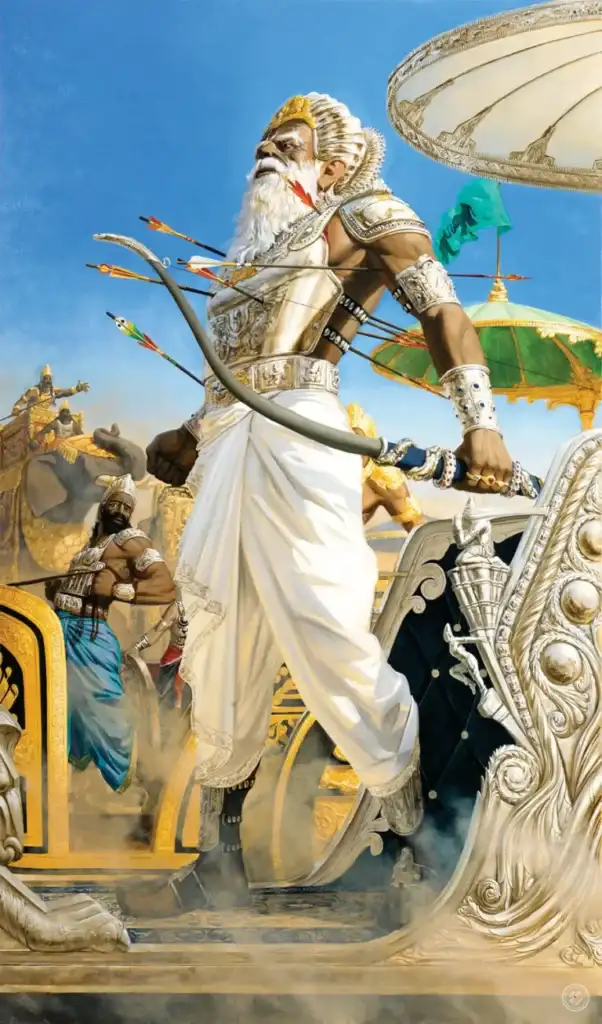
The Devotee’s Power: When Bhishma Compelled Krishna to Wield a Weapon
In the annals of the Mahabharata, one of the most profound moments that exemplifies the supremacy of devotion over all else is when Bhishma compelled Lord Krishna to break His vow during the Kurukshetra war. Krishna had pledged not to wield any weapons in the battle, choosing instead to be Arjuna’s charioteer. However, on the tenth day of the war, Bhishma’s prowess on the battlefield was so extraordinary that the Pandava forces were on the verge of defeat. Seeing this, Arjuna’s resolve wavered. It was then that Krishna, in His infinite compassion for His devotee and to uphold dharma, leapt from the chariot and charged towards Bhishma with a chariot wheel as His weapon. This act, breaking His own vow, not only showcases Krishna’s love for His devotees but also highlights Bhishma’s exalted position. As Srila Prabhupada explains, this incident demonstrates that the Lord is ultimately controlled by the love of His pure devotees. Bhishma’s unwavering devotion and martial skill were so intense that they moved the Supreme Personality of Godhead to transcend even His own promise, thereby revealing the ultimate truth of bhakti – that pure love for Krishna is the highest principle, surpassing all other considerations.
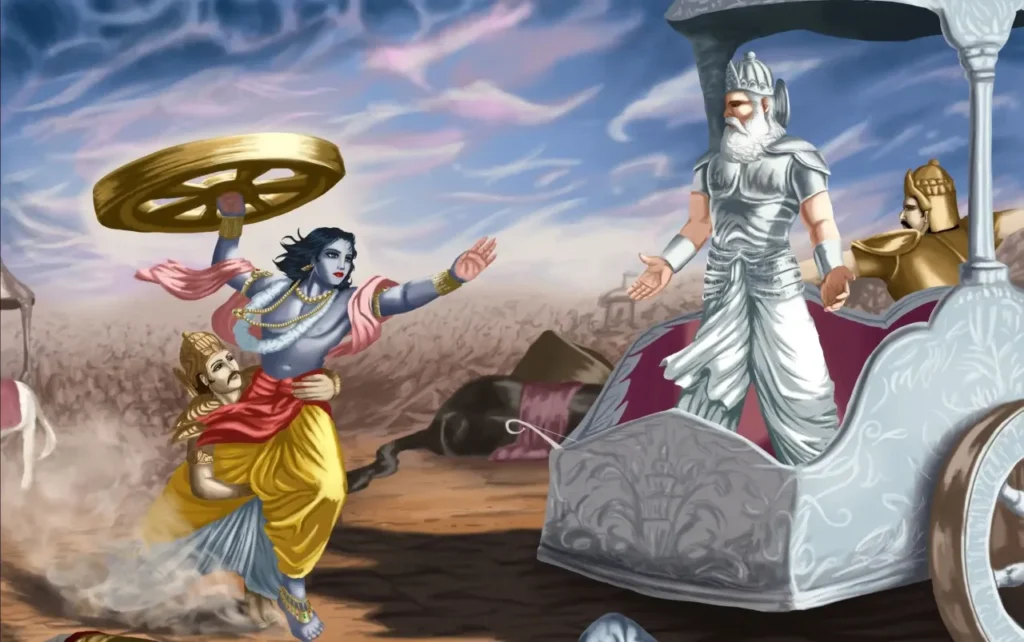
The Bed of Arrows: Lessons in Devotion
Bhishma’s final days on the battlefield, lying on a bed of arrows, offer profound teachings on devotional surrender. Despite his grievous wounds, his mind was fixed on Lord Krishna. This reminds us of the verse from Srimad-Bhagavatam (10.14.8):
“My Lord, one who earnestly waits for You to bestow Your causeless mercy upon him, all the while patiently suffering the reactions of his past misdeeds and offering You respectful obeisances with his heart, words and body, is surely eligible for liberation, for it has become his rightful claim.”
Bhishma’s unwavering devotion in his final moments exemplifies the highest goal of Krishna consciousness – to remember the Lord at the time of death, as instructed in the Bhagavad-gita (8.5).
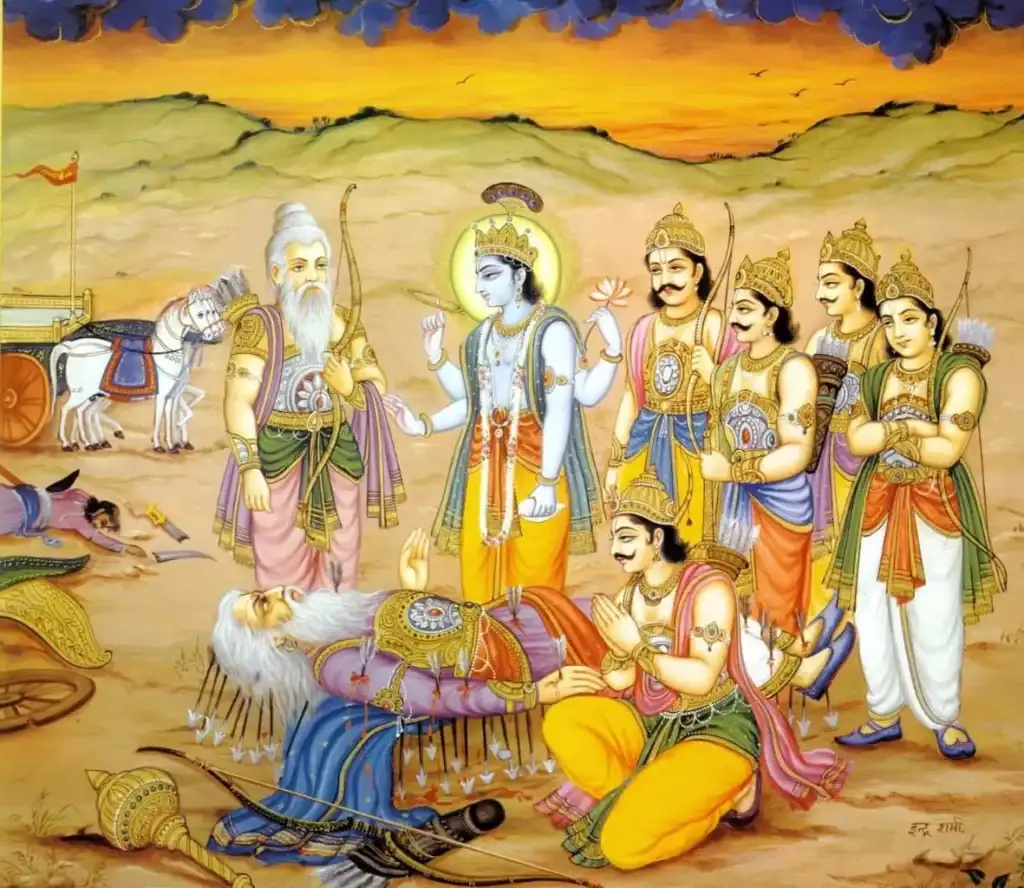
Bhishma’s Relevance in the Age of Kali
In our current age of Kali, where moral values are often compromised, Bhishma’s life serves as a guiding light. His uncompromising adherence to truth, his selfless service, and his devotion to the Lord offer a roadmap for navigating the complexities of modern life while maintaining our spiritual integrity.
Srila Prabhupada often emphasized that the characters of Mahabharata are not mere historical figures but eternal exemplars of devotional principles. By studying and contemplating Bhishma’s life, we can:
- Cultivate unwavering faith in Krishna’s plan, even in challenging circumstances.
- Learn to balance our worldly responsibilities with our spiritual aspirations.
- Develop the courage to stand up for righteousness, regardless of personal consequences.
- Understand the power of vows and the importance of keeping them.
- Appreciate the value of spiritual wisdom and the need to seek it from realized souls.
The incident of Krishna wielding wheel to attack Bhishma demonstrates that the Lord is ultimately controlled by the love of His pure devotees.
Conclusion: The Path of Bhakti
Bhishma’s life ultimately points us towards the supreme goal of Krishna consciousness – pure devotional service. His last words, fixated on the beautiful form of Lord Krishna, remind us of our own ultimate destination. As stated in the Srimad-Bhagavatam (1.2.6):
“The supreme occupation [dharma] for all humanity is that by which men can attain to loving devotional service unto the transcendent Lord. Such devotional service must be unmotivated and uninterrupted to completely satisfy the self.”
Let us draw inspiration from Bhishma’s extraordinary life and rededicate ourselves to the path of bhakti. May his unwavering devotion, his commitment to dharma, and his profound wisdom guide us in our spiritual journey back to Godhead.
Hare Krishna Hare Krishna Krishna Krishna Hare Hare
Hare Rama Hare Rama Rama Rama Hare Hare


